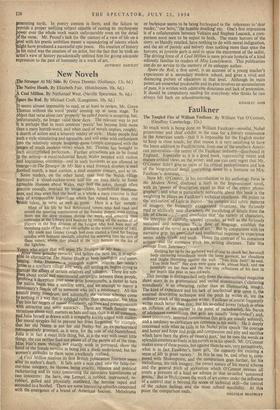New Novels
T seems almost impossible to read, or at least to review, Mr. Gwyn omas without the word 'poetic' coming up at some stage. To bject that verse alone can' properly' be called poetic is tempting, but, ortunately, no longer valid these days. The relevant way to put it is perhaps that in most contexts 'poetic' has become little more than a mere hurrah-word, and when used of novels implies, roughly, dearth of action and a leisurely oddity of style. Many people find '' uch a style stimulating and agreeable, and will enter with enthusiasm te or jenmlaputl relatively l modern osperfection.idem rpnl e verse) learisi eg wFigeuh-riegathhenirMear(simple omcompared Thomas ma has as rt eobroughtd b ew with tfound h t ht oe ' u t c; hg sa ges 1 ec accomplished the setting—a rural-industrial South Wales peopled with violent d loquacious cccentrics—and in such incidents as are allowed to rge-,--in The Stranger At My Side a mad firework display, a mad football match, a mad auction, a mad amateur concert, and so on. t Some readers, on the other hand, may find the Welsh village portrayed a cloud-cuckoo-town laid out on lines likely to foster agreeable illusions about Wales, may find the jokes, though often itenuine enough, overlaid by image-ridden, hyperbolical facetious- hess, and may even find the book as a whole a mere exercise in that tin of irresponsible logorrhea which has ruined more than one elsh talent, in verse as well as prose. Here is a fair sample: Most of his life he had denounced voters who had read and reread the sporting supplements of the Sunday papers, even cutting them out for slow revision during the week, and amazing their comrades at the Library and Institute by reeling off the names of all players in the first division of the League who had been sent off mouthing oaths of less than one syllable in the winter season of 1902. My uncle and Gomer Gough had even started a fund for buying candles with bottoms specially, adapted for screwing into the ears of these voters, whom they placed at the very bottom on the list of the lightless. Voters who enjoy that will enjoy The Stranger Al My Side. After these grouchy remarks, and before the next lot, it is agree- hie to characterise The Native Heath as both intelligent and enter- . Julia Dunstan, a. ,youngish widow, inherits her uncle's Ouse in a northern village ant; whil9 still settling in, begins trying to ge the affairs of certain relatives and villagers. There are sub- lets about social and matrimonial campaigns between these people, cii native a deception over some prize honeycombs, a threat to turn native heath into a satellite town, and an attempt to marry a 1n1ssionary's fiancee off to someone who isn't a missionary. All this ounds pretty humdrum, and admittedly the various schemes come nothing in a way that is subdued rather than spectacular, but Miss pair hits her targets of minor dishonesty, egotism and pretentiousness with attractive and witty accuracy. There are much funnier con- versations about such matters as hats and cats than is at all conunon, ' d Julia herself is drawn with a sympathy keenly edged with malice. r moral scruples fail to prevent her from forgetting, for example, that her old Nanny is not her old Nanny but an ex-parlourmaid retrospectively groomed, as it were, for the role of old-Nannyhood. Julia is in fact a sweet little thing, but, as is the way with sweet little things, she can neither fool nor please all of the people all of the time. Miss Fair's men, though not exactly weak in portrayal, show the hand of the female novelist in being just a shade undersexed, but her women's attitudes to them seem excellently realised. 4 Cool Million receives its first British publication fourteen -years after its author's death. It falls with a neat click into the fable-for- our-time category, its themes being cruelty, injustice and political racketeering and its story concerning the successive humiliations of two innocents: the hero, one Lemuel, is robbed, imprisoned, re- robbed, gulled and physically mutilated, the heroine raped and seconded to a brothel. There are some interesting episodes concerned with the emergence of a brand of American fascism. Melodrama
or burlesque seems to be being burlesqued in the references to 'dear reader," our hero," the humble dwelling' etc. One's first impression is of a collaboration between Voltaire and Stephen Leacock, a com- parison soon seen to be unjust to both. The many horrors of the story, so blandly retailed, have nothing to do with moral indignation, and the air of parody and naivety does nothing more than spice the horrors, as juvenile garb is said to spice the enjoyment of the sadist. The driving force of A Cool Million is mere private hysteria of a kind odiously familiar to readers of Miss Lonelyhearts. This publication can do no service to the memory of its unhappy author.
Spare, the Rod, a first novel, is an account of a young teacher's experiences at a secondary modern school, and gives a vivid and dismaying picture of education at that level. Although its main points are somewhat predictable and its plot involves no accumulation of pace, it is written with admirable directness and lack of pretension. It should be compulsory reading for everybody who thinks he can always fall back on schoolrnastering.
KINGSLEY AMIS


































 Previous page
Previous page